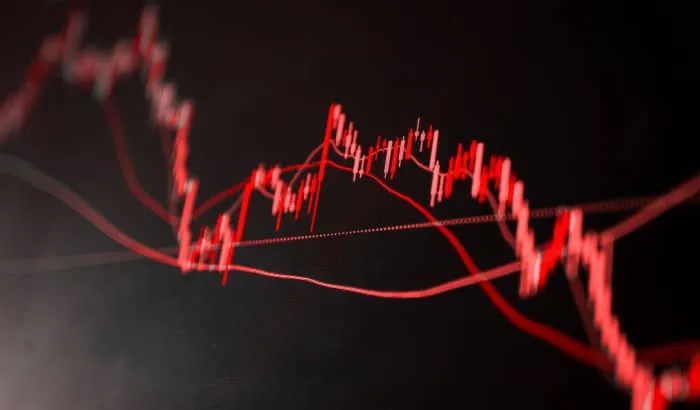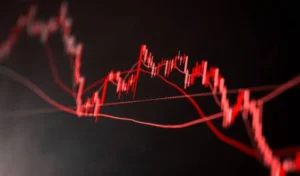Massive ₹7 Lakh Crore Market Crash: Tariffs, IT Headwinds & FII Exit Trigger Sharp Sell-Off

Massive ₹7 Lakh Crore Market Crash: Tariffs, IT Headwinds & FII Exit Trigger Sharp Sell-Off
Stock markets faced a harsh blow on September 26, as a sharp and unexpected sell-off led to a massive erosion of investor wealth. Benchmark indices — Sensex and Nifty — fell steeply, wiping out nearly ₹7 lakh crore from overall market capitalisation in just a single trading session. The slump was not limited to a single sector; weakness was broad-based, affecting pharma, IT, auto, banking, and financial services stocks.
Investor concerns intensified after a mix of global and domestic triggers spooked market sentiment, including fresh import tariffs announced by the U.S., weak global tech earnings, rising visa fees, and persistent selling by foreign institutional investors (FIIs).
Sensex ended the day down 733.22 points at 80,426.46, while the Nifty lost 236.15 points, closing at 24,654.70. The Bank Nifty also dropped significantly by 586.85 points to settle at 54,389.35. Midcap and smallcap indices weren’t spared either, falling by as much as 2%, while key sectoral indices like IT, PSU banks, metals, energy, and media fell between 1.5% and 2%.
Among the top BSE-listed companies, 26 of the 30 stocks closed in the red, with Mahindra & Mahindra, Sun Pharma, Bajaj Finance, and Zomato among the worst hit.
Key Reasons Behind the Sharp Fall in Indian Stock Markets
1. 100% Tariff on Pharma Products by the U.S.
A major trigger for the market sell-off was the announcement by U.S. President Donald Trump of a 100% import tariff on branded and patented pharmaceutical products originating from India, set to take effect from October 1. This move raised immediate concerns over earnings and export margins for Indian pharma companies that rely heavily on the U.S. market.
Additionally, Trump proposed more tariffs on other goods, including a 50% duty on kitchen cabinets and bathroom vanities, 30% on upholstered furniture, and 25% on heavy trucks. However, the pharma sector bore the brunt of the announcement.
The Nifty Pharma Index dropped by 2.55%, marking its fifth consecutive session of decline, and fell to a one-month low of 21,445.50. Every single stock within the index closed in the red. Notable losers included:
- Sun Pharma, down 3.8%
- Gland Pharma, fell 3.7%
- Natco Pharma, declined 3.5%
- Divi’s Labs, down 3%
- Biocon, dropped 2.5%
- IPCA Labs and Zydus Life, fell over 2%
- Dr. Reddy’s and Cipla, both declined between 2–3%
This tariff shock dealt a heavy blow to an already pressured sector and dampened investor sentiment across pharma stocks.
2. Weak IT Sentiment Due to Visa Costs & Accenture’s Earnings
Another major drag on the market was the decline in IT stocks, triggered by two major developments. Firstly, the U.S. administration announced an increase in H-1B visa fees, directly impacting Indian IT companies that send skilled professionals abroad to service global contracts. This raised concerns around higher operational costs and hiring restrictions for Indian tech majors.
Secondly, global IT giant Accenture reported a disappointing quarterly result, along with cautious commentary. The company signaled an “unstable recovery in global demand,” which unnerved investors and added to fears of a broader tech slowdown. As a result, the Nifty IT Index slipped by up to 1.3%, extending losses from earlier in the week.
With both macro and company-specific headwinds hitting the tech sector, Indian IT companies saw heavy selling, contributing further to the overall market correction.
3. Heavy Foreign Investor Selling
Foreign institutional investors (FIIs) continued to reduce their exposure to Indian equities, intensifying the market slide. On September 25, FIIs withdrew ₹4,995 crore, bringing the total outflow for the month of September to a massive ₹24,454 crore.
This level of selling not only increases volatility but also weakens market confidence, especially when domestic investors alone cannot offset the large-scale exit of foreign funds. As global uncertainties continue to rise, FIIs are shifting their portfolios toward safer or more attractive markets, leaving Indian stocks vulnerable to sharp corrections.
The combined effect of these triggers led to a major decline in investor wealth. The total BSE market capitalisation fell from ₹457.35 lakh crore to ₹450.55 lakh crore in a single day — reflecting a wealth loss of nearly ₹7 lakh crore. From blue-chip stocks to midcaps and smallcaps, the correction was widespread. Investors are now on edge, with uncertainty around global policy decisions and corporate performance still looming large.
Disclaimer: The stock market is subject to risks and volatility. This article is for informational purposes only. Always consult a certified financial advisor before making any investment decisions.












